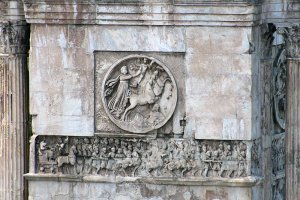Presented By: Classical Studies
Seneca’s Philosophical Circles: Time, Space, and the Sublime
Presented by Gareth Williams, Columbia University

In his talk, Professor Gareth Williams will explore certain patterns of circularity in nature by which Seneca articulates one version of the sublime in his philosophical prose works. The spatial circle and/or the temporal cycle provide a guiding model by which he creates a form of bridging between mundane, terrestrial experience on the one hand, and, on the other, the uplift towards the sublimity of cosmic consciousness. His argument focuses on the tension between these ‘higher’ and ‘lower’ viewpoints, and on the role that circularity plays in coordinating them within a coherent vision of cosmic operation.
Gareth Williams has taught at Columbia University since 1992. He received a Ph.D. in 1990 from Cambridge University for a dissertation on Ovid’s exilic writings that subsequently resulted in two books, the first Banished Voices: Readings in Ovid’s Exile Poetry (Cambridge, 1994) and the second The Curse of Exile: A Study of Ovid’s Ibis, Proceedings of the Cambridge Philological Society Supplementary Volume 19 (Cambridge, 1996).
Two distinct research phases followed, the first of which focused on the Latin ethical writings of Lucius Annaeus Seneca. Two monographs resulted, the first an edition with commentary of L. Annaeus Seneca: Selected Moral Dialogues. De Otio, De Brevitate Vitae (Cambridge, 2003); the second, The Cosmic Viewpoint: A Study of Seneca’s Natural Questions (Oxford, 2012), was awarded the Goodwin Award of Merit by the Society for Classical Studies in 2014. Most recently, among various other projects and edited volumes around Roman philosophy, his research has focused on the socio-literary culture of Renaissance Venice, an interest that resulted in the publication of Pietro Bembo on Etna: The Ascent of a Venetian Humanist (Oxford, 2017).
A general book on Ovid has recently been published: On Ovid’s Metamorphoses, New York, 2023, and a two-volume edition and annotated translation of selected writings of the fifteenth-century Venetian humanist Ermolao Barbaro is currently in press with Bloomsbury (Ermolao Barbaro, On Celibacy and On the Duty of the Ambassador, London, 2023).
Gareth Williams has taught at Columbia University since 1992. He received a Ph.D. in 1990 from Cambridge University for a dissertation on Ovid’s exilic writings that subsequently resulted in two books, the first Banished Voices: Readings in Ovid’s Exile Poetry (Cambridge, 1994) and the second The Curse of Exile: A Study of Ovid’s Ibis, Proceedings of the Cambridge Philological Society Supplementary Volume 19 (Cambridge, 1996).
Two distinct research phases followed, the first of which focused on the Latin ethical writings of Lucius Annaeus Seneca. Two monographs resulted, the first an edition with commentary of L. Annaeus Seneca: Selected Moral Dialogues. De Otio, De Brevitate Vitae (Cambridge, 2003); the second, The Cosmic Viewpoint: A Study of Seneca’s Natural Questions (Oxford, 2012), was awarded the Goodwin Award of Merit by the Society for Classical Studies in 2014. Most recently, among various other projects and edited volumes around Roman philosophy, his research has focused on the socio-literary culture of Renaissance Venice, an interest that resulted in the publication of Pietro Bembo on Etna: The Ascent of a Venetian Humanist (Oxford, 2017).
A general book on Ovid has recently been published: On Ovid’s Metamorphoses, New York, 2023, and a two-volume edition and annotated translation of selected writings of the fifteenth-century Venetian humanist Ermolao Barbaro is currently in press with Bloomsbury (Ermolao Barbaro, On Celibacy and On the Duty of the Ambassador, London, 2023).